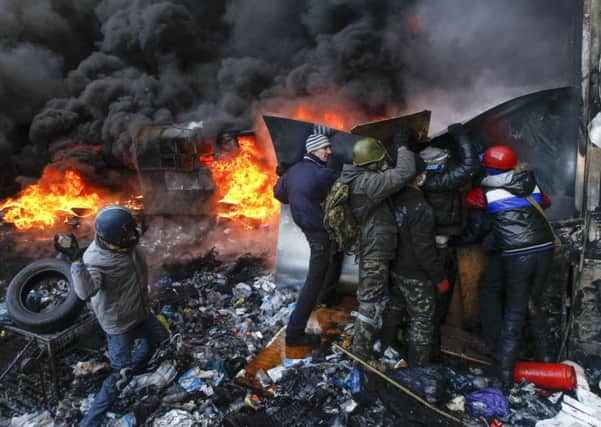Ukraine: President forced to act over Kiev clashes


The move suggests Mr Yanukovich might be ready to soften his hardline stance to find a compromise.
It came as former Soviet leader Mikhail Gorbachev urged Russian president Vladimir Putin and US president Barack Obama to help broker negotiations, saying Ukraine was facing “catastrophe”.
Advertisement
Hide AdAdvertisement
Hide AdLast night Mr Yanukovich held talks withopposition leaders, including heavyweight boxer-turned-politician Vitaly Klitschko, and anti-government demonstrators in Kiev agreed to a truce with police pending the outcome.
The parliamentary website said the special session would be held next Tuesday.
Underlining the level of mistrust between the government and opposition, prime minister Mykola Azarov accused protesters of trying to stage a coup d’etat, and dismissed the possibility of an early presidential election to resolve the standoff.
“All those who support this coup should say clearly, ‘Yes, we are for the overthrow of the legitimate authorities in Ukraine’, and not hide behind peaceful protesters,” Mr Azarov said at the World Economic Forum in Davos, Switzerland.
“A genuine attempt at a coup d’etat is being carried out,” Russian news agency Interfax quoted him as saying.
Mr Azarov said he had no plans to introduce a state of emergency: “We don’t see the need for tough and extreme measures at the moment … But don’t put the government into an impasse.
“People should not think the government lacks available resources to put an end to this. It is our constitutional right and obligation to restore order in the country.”
The protests against Mr Yanukovich began in November, when he pulled out of signing a free-trade deal with the European Union in favour of closer ties with former Soviet-era overlord, Mr Putin’s Russia.
Advertisement
Hide AdAdvertisement
Hide AdThe unrest has swollen in recent weeks, and turned violent on Sunday when hard-core radicals broke away from the main protest area in Kiev and clashed with riot police. Three protesters have been killed – two from gunshot wounds – and more than 150 police and 300 protesters have been injured.
Outside Kiev, thousands stormed the regional administration headquarters in Rivne in western Ukraine yesterday, breaking down doors and demanding the release of people detained in the unrest there.
The turmoil has caused alarm abroad, and German chancellor Angela Merkel has expressed anger over the crackdown on protesters.
“We are greatly worried, and not only worried, but also outraged at the way laws have been pushed through that call these freedoms into question,” she told a news conference.
But Mrs Merkel added that it would be wrong for Europe to respond to the violence with sanctions at this stage.
French president François Hollande called on Ukrainian authorities to “rapidly seek dialogue”.
A European Commission spokesman said Mr Yanukovich had spoken to EC president Jose-Manuel Barroso and assured him he was ready to maintain political dialogue and saw no need to impose a state of emergency.
Yesterday Mr Yanukovich told parliamentary speaker Volodymyr Rybak the “situation must be settled immediately”. Mr Rybak said the proposed emergency session could consider the opposition’s call for Mr Azarov’s government to step down.
Advertisement
Hide AdAdvertisement
Hide AdHe added that “questions linked to laws passed by parliament” could be discussed – a reference to anti-protest legislation rammed through last week by Yanukovich loyalists, which fuelled protests and led to opposition calls for their repeal.